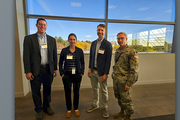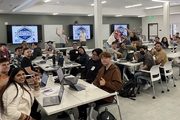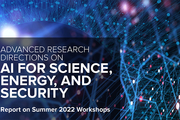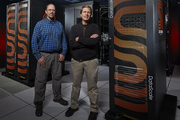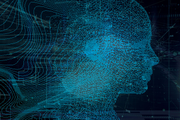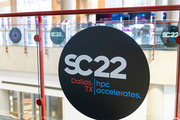Did you know we have a monthly newsletter? View past volumes and subscribe.
Igniting scientific discovery with AI and supercomputing (VIDEO)
April 15, 2024 -
LLNL’s fusion ignition breakthrough, more than 60 years in the making, was enabled by a combination of traditional fusion target design methods, high-performance computing (HPC), and AI techniques. The success of ignition marks a significant milestone in fusion energy research, and was facilitated in part by the precision simulations and rapid experimental data analysis only possible through...
Predicting climate change impacts on infrastructure (VIDEO)
Feb. 26, 2024 -
At LLNL, electrical grid experts and climate scientists work together to bridge the gap between infrastructure and climate modeling. By taking weather variables such as wildfire, flooding, wind, and sunlight that directly impact the electrical grid into consideration, researchers can improve electrical grid model projections for a more stable future. In a new video, LLNL computer scientist...
Machine learning tool fills in the blanks for satellite light curves
Feb. 13, 2024 -
When viewed from Earth, objects in space are seen at a specific brightness, called apparent magnitude. Over time, ground-based telescopes can track a specific object’s change in brightness. This time-dependent magnitude variation is known as an object’s light curve, and can allow astronomers to infer the object’s size, shape, material, location, and more. Monitoring the light curve of...
Lab partners with new Space Force Lab
Nov. 14, 2023 -
LLNL subject matter experts have been selected by the U.S. Space Force to help stand up its newest Tools, Applications, and Processing (TAP) laboratory dedicated to advancing military space domain awareness (SDA). The Livermore team attended the October 26 kickoff in Colorado Springs of the SDA TAP lab’s Project Apollo technology accelerator, designed with an open framework to support and...
UC Merced & UC Riverside tackle Data Science Challenge on ML-assisted heart modeling
Aug. 3, 2023 -
For the first time, students from the University of California (UC) Merced and UC Riverside joined forces for the two-week Data Science Challenge (DSC) at LLNL, tackling a real-world problem in machine learning (ML)-assisted heart modeling. Held in the Livermore Valley Open Campus’s newly remodeled University of California Livermore Collaboration Center from July 10-21, the event brought...
High-performance computing, AI and cognitive simulation helped LLNL conquer fusion ignition
June 21, 2023 -
For hundreds of LLNL scientists on the design, experimental, and modeling and simulation teams behind inertial confinement fusion (ICF) experiments at the National Ignition Facility, the results of the now-famous Dec. 5, 2022, ignition shot didn’t come as a complete surprise. The “crystal ball” that gave them increased pre-shot confidence in a breakthrough involved a combination of detailed...
Visionary report unveils ambitious roadmap to harness the power of AI in scientific discovery
June 12, 2023 -
A new report, the product of a series of workshops held in 2022 under the guidance of the U.S. Department of Energy’s Office of Science and the National Nuclear Security Administration, lays out a comprehensive vision for the Office of Science and NNSA to expand their work in scientific use of AI by building on existing strengths in world-leading high performance computing systems and data...
Consulting service infuses Lab projects with data science expertise
June 5, 2023 -
A key advantage of LLNL’s culture of multidisciplinary teamwork is that domain scientists don’t need to be experts in everything. Physicists, chemists, biologists, materials engineers, climate scientists, computer scientists, and other researchers regularly work alongside specialists in other fields to tackle challenging problems. The rise of Big Data across the Lab has led to a demand for...
Data science meets fusion (VIDEO)
May 30, 2023 -
LLNL’s historic fusion ignition achievement on December 5, 2022, was the first experiment to ever achieve net energy gain from nuclear fusion. However, the experiment’s result was not actually that surprising. A team leveraging data science techniques developed and used a landmark system for teaching artificial intelligence (AI) to incorporate and better account for different variables and...
LLNL and SambaNova Systems announce additional AI hardware to support Lab’s cognitive simulation efforts
May 23, 2023 -
LLNL and SambaNova Systems have announced the addition of a spatial data flow accelerator into the Livermore Computing Center, part of an effort to upgrade the Lab’s CogSim program. LLNL will integrate the new hardware to further investigate CogSim approaches combining AI with high-performance computing—and how deep neural network hardware architectures can accelerate traditional physics...
Patent applies machine learning to industrial control systems
May 8, 2023 -
An industrial control system (ICS) is an automated network of devices that make up a complex industrial process. For example, a large-scale electrical grid may contain thousands of instruments, sensors, and controls that transfer and distribute power, along with computing systems that capture data transmitted across these devices. Monitoring the ICS network for new device connections, device...
Computing codes, simulations helped make ignition possible
April 6, 2023 -
Harkening back to the genesis of LLNL’s inertial confinement fusion (ICF) program, codes have played an essential role in simulating the complex physical processes that take place in an ICF target and the facets of each experiment that must be nearly perfect. Many of these processes are too complicated, expensive, or even impossible to predict through experiments alone. With only a few...
Scientists develop model for more efficient simulations of protein interactions linked to cancer
March 28, 2023 -
LLNL scientists have developed a theoretical model for more efficient molecular-level simulations of cell membranes and their lipid-protein interactions, part of a multi-institutional effort to better understand the behavior of cancer-causing membrane proteins. Developed under an ongoing collaboration by the Department of Energy and the National Cancer Institute (NCI) aimed at modeling cell...
From plasma to digital twins
March 13, 2023 -
LLNL's Nondestructive Evaluation (NDE) group has an array of techniques at its disposal for inspecting objects’ interiors without disturbing them: computed tomography, optical laser interferometry, and ultrasound, for example, can be used alone or in combination to gauge whether a component’s physical and material properties fall within allowed tolerances. In one project, the team of NDE...
Cognitive simulation supercharges scientific research
Jan. 10, 2023 -
Computer modeling has been essential to scientific research for more than half a century—since the advent of computers sufficiently powerful to handle modeling’s computational load. Models simulate natural phenomena to aid scientists in understanding their underlying principles. Yet, while the most complex models running on supercomputers may contain millions of lines of code and generate...
Supercomputing’s critical role in the fusion ignition breakthrough
Dec. 21, 2022 -
On December 5th, the research team at LLNL's National Ignition Facility (NIF) achieved a historic win in energy science: for the first time ever, more energy was produced by an artificial fusion reaction than was consumed—3.15 megajoules produced versus 2.05 megajoules in laser energy to cause the reaction. High-performance computing was key to this breakthrough (called ignition), and HPCwire...
National Ignition Facility achieves fusion ignition
Dec. 13, 2022 -
The U.S. Department of Energy (DOE) and DOE’s National Nuclear Security Administration (NNSA) today announced the achievement of fusion ignition at LLNL—a major scientific breakthrough decades in the making that will pave the way for advancements in national defense and the future of clean power. On Dec. 5, a team at LLNL’s National Ignition Facility (NIF) conducted the first controlled...
LLNL staff returns to Texas-sized Supercomputing Conference
Nov. 23, 2022 -
The 2022 International Conference for High Performance Computing, Networking, Storage, and Analysis (SC22) returned to Dallas as a large contingent of LLNL staff participated in sessions, panels, paper presentations, and workshops centered around HPC. The world’s largest conference of its kind celebrated its highest in-person attendance since the start of the COVID-19 pandemic, with about 11...
Understanding the universe with applied statistics (VIDEO)
Nov. 17, 2022 -
In a new video posted to the Lab’s YouTube channel, statistician Amanda Muyskens describes MuyGPs, her team’s innovative and computationally efficient Gaussian Process hyperparameter estimation method for large data. The method has been applied to space-based image classification and released for open-source use in the Python package MuyGPyS. MuyGPs will help astronomers and astrophysicists...
LLNL researchers win HPCwire award for applying cognitive simulation to ICF
Nov. 17, 2022 -
The high performance computing publication HPCwire announced LLNL as the winner of its Editor’s Choice award for Best Use of HPC in Energy for applying cognitive simulation (CogSim) methods to inertial confinement fusion (ICF) research. The award was presented at the largest supercomputing conference in the world: the 2022 International Conference for High Performance Computing, Networking...



